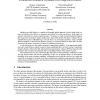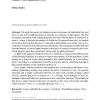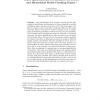82 search results - page 16 / 17 » Nash equilibria set computing in finite extended games |
WIOPT
2010
IEEE
13 years 4 months ago
2010
IEEE
—Cognitive radio networks provide the capability to share the wireless channel with licensed (primary) users in an opportunistic manner. Primary users have a license to operate i...
PODC
2009
ACM
14 years 6 months ago
2009
ACM
Imitating successful behavior is a natural and frequently applied approach to trust in when facing scenarios for which we have little or no experience upon which we can base our d...
MST
2011
13 years 29 days ago
2011
We study the impact of collusion in network games with splittable flow and focus on the well established price of anarchy as a measure of this impact. We first investigate symmet...
CSL
2006
Springer
13 years 9 months ago
2006
Springer
Game quantification is an expressive concept and has been studied in model theory and descriptive set theory, especially in relation to infinitary logics. Automatic structures on t...
SIGMETRICS
2008
ACM
13 years 6 months ago
2008
ACM
We consider a wireless collision channel, shared by a finite number of mobile users who transmit to a common base station using a random access protocol. Mobiles are selfoptimizin...



